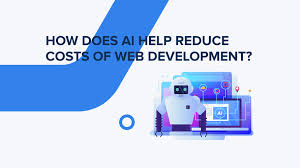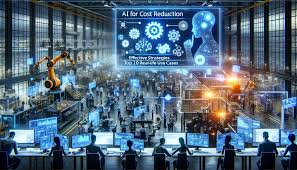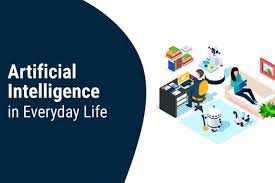
In today’s digital age, having a strong online presence is crucial for businesses of all sizes, including small enterprises. However, for small businesses with limited budgets, the costs associated with traditional web development—ranging from hiring skilled developers to maintaining the site—can be a significant barrier. Fortunately, the rise of Artificial Intelligence (AI) is transforming how websites are built and maintained, making web development more accessible and cost-effective than ever before.
In this blog, we’ll explore how AI is helping small businesses reduce costs while improving the functionality, design, and user experience of their websites.
1. AI-Powered Website Builders: No Coding Required
One of the most direct ways AI is making web development more affordable for small businesses is through AI-powered website builders. These platforms use AI algorithms to simplify the process of creating a website, eliminating the need for professional developers or designers.
How It Works:
AI website builders such as Wix, Squarespace, and Bookmark use machine learning to analyze a business’s needs, industry, and goals. They then automatically generate a website design tailored to those parameters. The AI selects the layout, color scheme, fonts, and even content suggestions based on the user’s input.
Cost Savings:
- No need for developers: Small business owners can build their websites themselves without the need for a coding expert.
- Quick turnaround: These tools significantly speed up the website creation process, which reduces the hours billed by web development professionals.
- Affordable subscription models: Most AI-powered builders offer budget-friendly pricing plans, often including hosting and maintenance services as part of the package.
2. Automated Design and Content Creation
AI is not only streamlining the technical side of web development but also assisting with design and content creation—two areas that can drive up the cost of developing a website.
AI-Driven Design Assistance:
Many AI platforms offer design suggestions and customization tools that automatically adapt to the user’s preferences. By understanding visual trends and user behavior, AI can recommend the most effective layouts and design elements that engage visitors and align with the business’s branding.
AI-Generated Content:
AI tools such as Copy.ai, Writesonic, and Jasper are now capable of generating high-quality text content, including blog posts, product descriptions, and marketing copy. These tools analyze your business’s voice and tone and generate content based on that, saving businesses the cost of hiring content creators.
Cost Savings:
- Reduced reliance on designers and writers: Small businesses can skip the high fees of professional designers and copywriters, as AI tools can handle both tasks at a fraction of the cost.
- Consistency in branding: AI helps maintain consistency in design and tone across the website, ensuring a cohesive user experience.
3. AI for Website Optimization and Maintenance
After a website is launched, ongoing maintenance and optimization are necessary to ensure it runs smoothly. Traditionally, this could mean hiring a team to handle site updates, security, and performance monitoring. However, AI is now automating many of these tasks, making maintenance more affordable for small businesses.
Automated Website Monitoring:
AI-powered tools like Uptime Robot, Google Analytics, and SEMrush provide real-time monitoring and insights into a website’s performance. These platforms can automatically identify broken links, slow loading times, and other technical issues, alerting the business owner to take corrective action.
AI for SEO:
SEO is essential for driving organic traffic, but optimizing a website for search engines can be time-consuming and costly. AI tools such as Yoast SEO and Surfer SEO use machine learning to analyze a website’s content and suggest improvements. These tools can help small businesses rank higher on search engines without having to hire expensive SEO experts.
Cost Savings:
- Less reliance on external services: AI can monitor site performance and suggest improvements, meaning fewer external contractors are needed to maintain the website.
- Increased ROI: By optimizing SEO and website performance using AI, small businesses can attract more visitors without paying for expensive ad campaigns or hiring multiple specialists.
4. AI Chatbots for Customer Service
Small businesses often have limited resources for customer support. Traditionally, hiring a full-time customer service team is costly and may not be feasible for a smaller operation. AI-powered chatbots have become a game-changer, offering a cost-effective alternative.
How AI Chatbots Help:
AI-driven chatbots, such as those powered by tools like Tidio, Drift, and ManyChat, can handle basic customer inquiries 24/7. These chatbots can answer common questions, help with order tracking, and even collect customer information. The AI learns from interactions, constantly improving its ability to provide accurate responses.
Cost Savings:
- Lower customer service costs: Chatbots reduce the need for hiring additional customer support staff.
- Faster response times: Chatbots can handle multiple customers simultaneously, ensuring quicker response times and improving customer satisfaction.
5. AI for Personalized User Experience
Personalization is a key factor in improving conversion rates and user engagement on websites. Traditionally, personalized experiences required custom coding or expensive software integrations. However, AI is making it easier for small businesses to offer personalized experiences to website visitors.
How AI Personalization Works:
AI tools can analyze a user’s browsing behavior, preferences, and demographic information to offer personalized content, product recommendations, and even dynamic pricing. For example, an AI-powered recommendation engine on an e-commerce website can suggest products based on a visitor’s previous purchases or items they’ve viewed.
Cost Savings:
- Increased conversions: Personalized experiences lead to higher user engagement and conversion rates, ultimately driving sales and reducing the need for costly marketing campaigns.
- Enhanced customer loyalty: By offering relevant content and recommendations, businesses can keep customers coming back, reducing customer acquisition costs.
6. AI in Web Hosting and Security
For small businesses, website hosting and security are ongoing concerns, often involving expensive third-party services. AI is now playing a critical role in providing both.
AI-Enhanced Web Hosting:
AI-powered hosting services such as SiteGround and Hostinger use machine learning to optimize server resources, ensuring that websites run efficiently. AI can automatically allocate bandwidth, detect vulnerabilities, and optimize loading speeds.
AI for Cybersecurity:
Cybersecurity is crucial, and AI is now used to monitor websites for potential threats. Tools like Sucuri use AI algorithms to detect unusual traffic patterns and potential security breaches in real-time, offering small businesses proactive protection.
Cost Savings:
- Reduced hosting fees: AI can optimize server resource allocation, potentially lowering web hosting costs.
- Lower security costs: AI-powered security tools reduce the need for expensive manual monitoring and vulnerability scans.
Conclusion: AI is Leveling the Playing Field for Small Businesses
AI is making web development more affordable, efficient, and scalable for small businesses. From building websites without coding knowledge to automating design, content creation, SEO, and customer service, AI is empowering small businesses to create professional, high-performing websites on a budget.
The cost savings and enhanced capabilities offered by AI tools allow small businesses to compete in the digital landscape without needing a large development team or a hefty budget. As AI continues to evolve, we can expect even more opportunities for small businesses to streamline their online operations and deliver better experiences for their customers—all while keeping costs under control.

